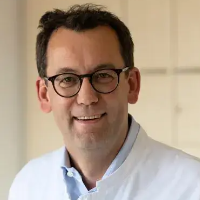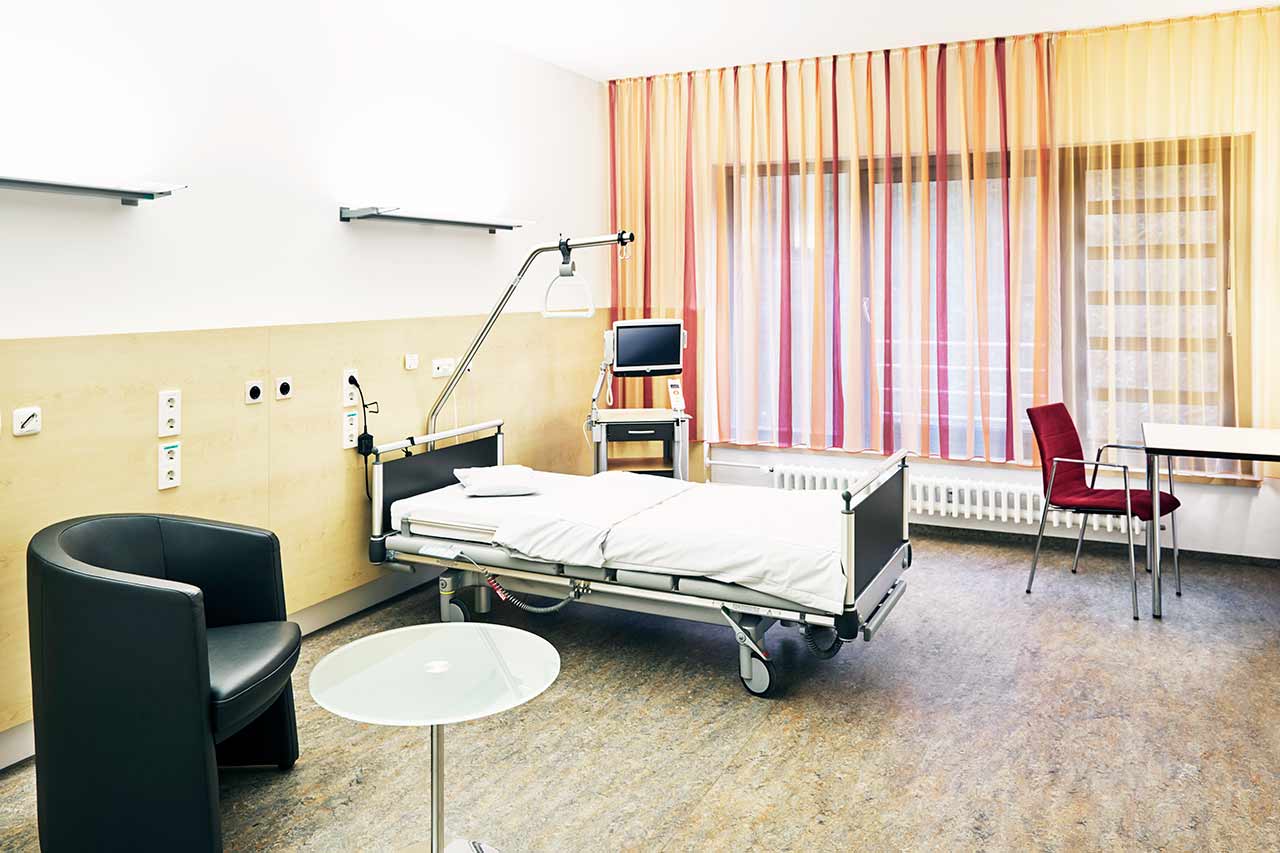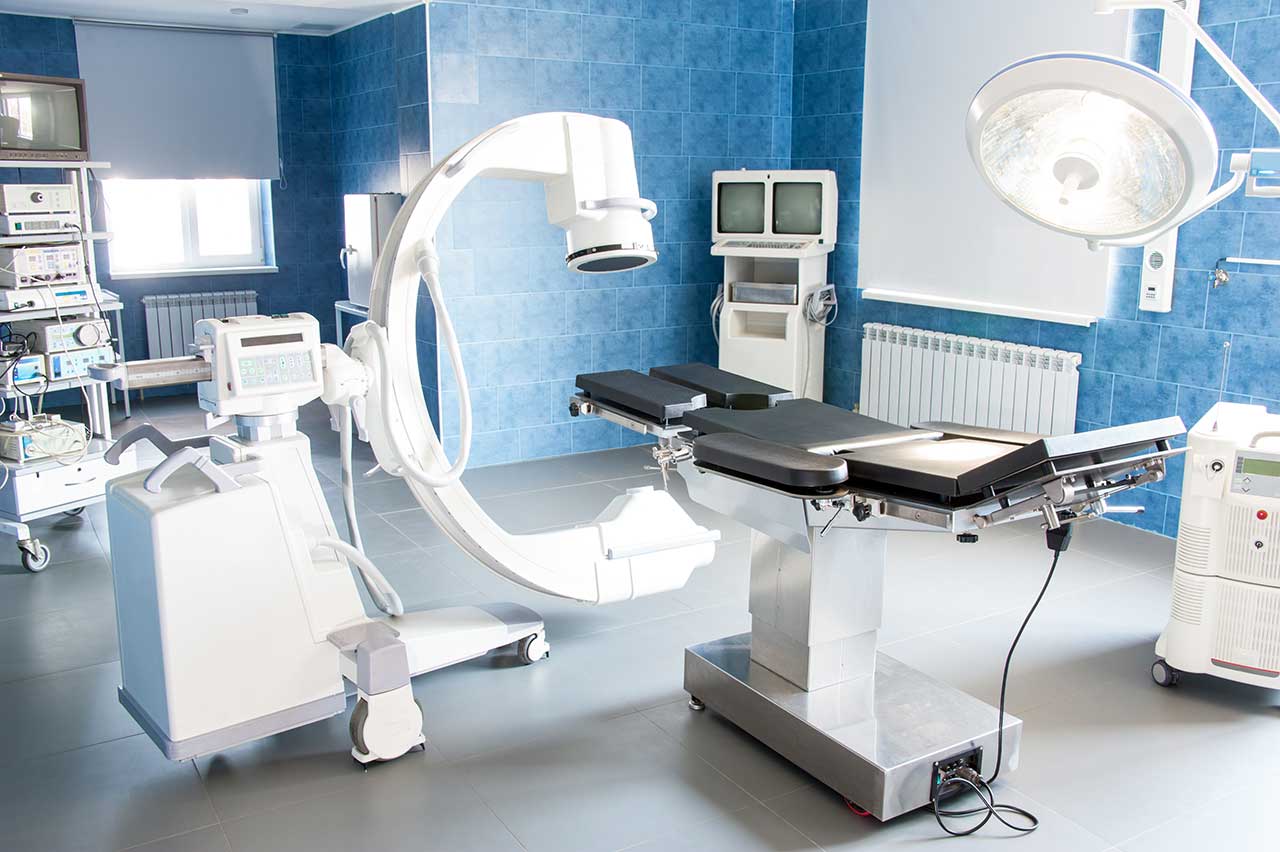
The program includes:
- Initial presentation in the clinic
- clinical history taking
- review of medical records
- physical examination
- urological examination
- laboratory tests:
- complete blood count
- general urine analysis
- biochemical analysis of blood
- inflammation indicators (CRP, ESR)
- indicators of blood coagulation
- tumor markers
- ultrasound scan of the urogenital system
- CT scan/MRI of the abdomen and pelvis
- preoperative care
- da Vinci kidney removal
- histological and immunohistochemical
examination of the removed tissues - symptomatic treatment
- control examinations
- the cost of essential medicines and materials
- nursing services
- full hospital accommodation
- explanation of future recommendations
How program is carried out
During the first visit, the physician will conduct a clinical examination and go through the results of the available diagnostic tests. After that, you will undergo the necessary additional examination, such as the assessment of liver and kidney function, ultrasound scan of the genitourinary system, CT scan and MRI. Based on the results of an additional examination, the physician will clarify the stage of the oncological process, choose the surgical technique and the type of anesthesia.
Surgery with the da Vinci robot starts with general anesthesia. After anesthesia, the surgeon makes small incisions on the anterior abdominal wall, through which he inserts the da Vinci robot manipulators and a video camera into the abdominal cavity and retroperitoneal space. With the help of manipulators, the doctor dissects the ligamentous apparatus of the kidney, excises the affected part of the kidney, or removes the entire organ. The video camera continuously transmits a three-dimensional image of the surgical area in 12-fold magnification to the monitor. The part of the kidney is removed, the surgeon installs a drainage into the abdominal cavity and finishes the operation.
By assessing the kidney blood supply to the FireFly mode, the surgeon ligates or coagulates large blood vessels in advance. This can significantly reduce blood loss during surgery, while maintaining the blood supply to the healthy part of the kidney. Resection of a malignant tumor with the da Vinci robot preserves kidney function as much as possible.
After the completion of the operation, you will be transferred back to the ward, under the supervision of the attending physician and nursing staff. Due to the minimal invasiveness of the operation and the short duration of general anesthesia, you will not need to stay in the intensive care unit for a long time.
Finally, the attending physician will evaluate the results of control examinations, schedule the date of discharge from the hospital and give you detailed recommendations for further follow-up and treatment.
Required documents
- Medical records
- MRI/CT scan (not older than 3 months)
- Biopsy results (if available)
Service
You may also book:
 BookingHealth Price from:
BookingHealth Price from:
About the department
The Department of Adult and Pediatric Urology at the Marien Hospital Duesseldorf offers the full range of medical services in the field of prevention, diagnostics and treatment of urologic diseases. The department's team of doctors admits not only adults, but also children with diseases of the reproductive (men) and urinary (men and women) systems. The specialists of the medical facility successfully perform open and endoscopic, percutaneous and minimally invasive surgical interventions. The department is part of the Center for Interdisciplinary Robotic Surgery (ZIRO), which provides patients with high-tech medical care at the highest international level. The department is equipped with the innovative da Vinci-X® robotic surgery system, which is the most modern model of the da Vinci surgical system for minimally invasive interventions that are currently the gold standard for the surgical treatment of many urologic diseases. The department has 45 beds for patient hospitalization. The department's doctors make sure that each patient receives effective treatment, taking into account his individual needs and wishes. The department is headed by Prof. Dr. med. Patrick Bastian.
The department's specialists pay due attention to updating the equipment and improving the skills of working with it. This is one of the few departments in Germany where the da Vinci-X® surgical system is successfully used. The da Vinci-X® system is equipped with two independent optical systems transmitting a Full HD (3D) image to the screen. In addition, the cameras provide image zooming up to 15 times. This creates conditions for filigree accurate microsurgery. Performing prostate surgery with the da Vinci-X® surgical system is a guarantee of maintaining normal urination and sexual function. Other advantages of robot-assisted surgery include the absence of severe pain, minimal blood loss, good aesthetic results of the intervention, and a reduced hospitalization period. The department's urologists successfully perform robot-assisted interventions for prostate cancer, organ-preserving surgery for kidney tumors, and total bladder removal in the case of cancer. Robot-assisted techniques can also be used in reconstructive surgery: replantation of the ureter into the bladder, reconstructive surgery for renal pelvis and ureteral stenosis.
An important focus of work of the department's specialists is on the provision of medical care to patients with malignant diseases of the reproductive system (men) and urinary system (men and women). Prostate cancer is the most common type of oncology in men. The doctor determines the treatment tactics depending on the stage of the oncological process – the more advanced the stage, the more radical treatment it requires. In the early stages, the focus is on accurate diagnostics (up to genetic tests), endoscopic treatment methods and elimination of risk factors for disease recurrence. In the advanced stages, priority is given to surgical interventions with the preservation of fertility and sexual function, as well as to adjuvant chemotherapy with the use innovative drugs. In addition to the department's own developments, the medical facility actively uses the results of world and European research. The treatment is carried out in close cooperation with oncologists, radiation therapists and general practitioners. The department's team of doctors specializes in the treatment of other malignant diseases, including bladder, adrenal, kidney, testicular and penile cancers. For the above mentioned cancers, the main treatment method is usually surgical resection of the tumor or the affected organ. The operation is often supplemented with chemotherapy, radiation therapy and other conservative treatments.
Benign urologic diseases are also common in the department's clinical practice. These include benign prostatic hyperplasia, kidney stone disease, urinary incontinence in men and women. In the early stages, pathologies are eliminated with conservative methods, while the advanced forms usually require surgical interventions. As a rule, the department performs low traumatic and minimally invasive operations.
Specially trained department's doctors provide medical care to young patients with urologic diseases. Particular attention is paid to the repair of congenital and acquired genitourinary malformations in boys. The department's team has successful experience in the treatment of enuresis (urinary incontinence) in children.
The department's main clinical activities include:
- Diagnostics and treatment of urologic cancers
- Prostate cancer
- Total prostate removal (radical prostatectomy)
- Radiation therapy (percutaneous irradiation with a linear accelerator, brachytherapy)
- Chemotherapy
- Hormone therapy
- Bladder cancer
- Transurethral resection, injection of special drugs (for example, mitomycin, BCG) for superficial tumors
- Total bladder removal (radical cystectomy)
- Chemotherapy
- Radiation therapy
- Kidney cancer
- Surgical kidney removal
- Tumor removal (in small tumors) with kidney preservation
- Tumor embolization
- Adrenal cancer
- Surgical removal of the tumor or the affected organ
- Chemotherapy
- Radiation therapy
- Testicular cancer
- Surgical removal of the tumor
- Radiation therapy
- Chemotherapy
- Penile cancer
- Local surgical removal of the tumor (in the early stages)
- Major surgical interventions
- Radiation therapy
- Chemotherapy
- Prostate cancer
- Diagnostics and treatment of benign prostatic hyperplasia
- Conservative treatment methods (alpha-adrenergic blockers, 5-alpha-reductase inhibitors, etc.) and surgical treatment
- Diagnostics and treatment of kidney stone disease
- Drug therapy in combination with concomitant antibacterial therapy
- Extracorporeal shock wave lithotripsy (ESWL)
- Minimally invasive interventions
- Open surgery
- Diagnostics and treatment of urinary incontinence in men and women (within the specialized center)
- Conservative treatment methods: biofeedback, electrostimulation, drug therapy, etc.
- Surgical treatment methods: Botox injections, TVT sling procedures, laparoscopic rectocolposacropexy, sacral neuromodulation, etc.
- Diagnostics and treatment of urologic diseases in children
- Laparoscopic percutaneous and transurethral surgery
- Correction of congenital genitourinary malformations
- Treatment of urinary incontinence in children, reconstructive and plastic genital surgery
- Other medical services
Curriculum vitae
University Education and Postgraduate Training
- 1993 - 1999 Study of Medicine at the Universities of Budapest, Bochum, Sydney, Huntsville (USA) and Cape Town.
- 27.10.2000 Doctoral dissertation defense. Subject: «Retrospective morphological and clinical examination of prostate cancer patients», Institute of Pathology at the Rhenish Friedrich-Wilhelm University of Bonn.
- 20.06.2007 Professorship (habilitation). Subject: «CpG island hypermethylation as a molecular marker of prostate cancer – significance for diagnosis and prognosis», Department of Urology at the University Hospital Bonn.
- 02.02.2012 Extraordinary Professorship at Ludwig Maximilian University of Munich, accelerated procedure (for outstanding scientific achievements), 4 years instead of 6.
Medical and Research Activities
- 02.2000 - 01.2001 Intern, Department of Surgery, St. Elizabeth Hospital Cologne-Hohenlind.
- 02.2001 - 07.2001 Intern, Department of Urology, St. Josef Hospital Troisdorf.
- 08.2001 - 12.2006 Fellow of the Department of Urology at the University Hospital Bonn.
- 09.2003 - 09.2004 Research Fellowship, Sidney Kimmel Cancer Center, James Buchanan Brady Urological Institute, Johns Hopkins University School of Medicine, Baltimore, Maryland, USA.
- 01.2007 - 09.2007 Senior Physician of the Department of Urology at the University Hospital Bonn.
- 10.2007 - 09.2012 Senior Physician of the Department of Urology at the University Hospital of Ludwig Maximilian University of Munich, Grosshadern and Innenstadt Campuses.
- 01.2008 - 10.2012 Coordinator/Head of the Prostate Center in the Department of Urology, University Hospital of Ludwig Maximilian University of Munich.
- 01.2011 - 09.2012 Head of the Interdisciplinary Working Group on Cancer at the Comprehensive Cancer Center Munich, University Hospital of Ludwig Maximilian University of Munich.
- 06.2011 - 12.2011 Head of the Department of Urology, Innenstadt Campus, University Hospital of Ludwig Maximilian University of Munich.
- 01.10.2012 Head Physician of the Department of Urology, Paracelsus Clinic Golzheim Duesseldorf.
- Since 01.11.2015 Head Physician of the Department of Adult and Pediatric Urology at the Marien Hospital Duesseldorf.
Scientific Awards (selected)
- 2012 Crystal Matula Award of the European Association of Urology.
- 2010 President's Award of the German Cancer Society.
- 2007 Carl Erich Alken Award of the Carl Erich Alken Foundation.
- 2007 Maximilian Nitze Award of the German Society of Urology (highest scientific award of the German Society of Urology).
Qualifications
- Board certification in urology.
- Special urological surgery.
- Drug tumor treatment.
- Andrology.
- X-ray diagnostics of the urinary tract.
- Special interventional radiology.
- Member of the European Board of Urology (FEBU).
Memberships in Professional Societies
- German Society of Urology (DGU).
- North Rhine-Westphalia Society of Urology (NRWGU).
- European Association of Urology (EAU).
- European School of Urology (ESU) of the European Association of Urology.
- American Urological Association (AUA).
- American Association for Cancer Research
- German Cancer Aid.
- Working Group on Urologic Oncology of the German Cancer Aid.
- Endourological Society.
Review Activities in Scientific Journals
- New England Journal of Medicine.
- Lancet Oncology.
- Gut.
- European Urology.
- Clinical Cancer Research.
- International Journal of Cancer.
- British Journal of Cancer.
- Nature Clinical Practice Urology.
- Cancer Epidemiology, Biomarkers and Prevention.
- The Journal of Molecular Diagnostics.
- The Journal of Urology.
- Current Cancer Drug Targets.
- PLOS One.
- World Journal of Urology.
- BMC Cancer.
- BJU International.
- Prostate Cancer and Prostatic Disease.
- Asian Journal of Andrology.
- Urology.
- BMC Urology.
- Urologia Internationalis.
- Der Urologe A.
- Aktuelle Urologie.
Photo of the doctor: (c) Marien Hospital Düsseldorf
About hospital
The Marien Hospital Duesseldorf is a modern medical facility in the very center of Duesseldorf and a recognized Research Center. The foundation stone of the hospital was laid back in 1864 with the support of the Catholic Church. The Christian principles of helping and supporting patients have not changed at all over the years, but the level of medical care has become fundamentally different: a small hospital has been transformed into a multidisciplinary medical center with 11 internal departments, institutes and 7 interdisciplinary centers. Thus, patients can receive a comprehensive diagnostic examination and treatment under one roof. The medical facility is an academic hospital, so patients have access to innovative achievements in the field of modern medicine and receive the most effective treatment.
The hospital has 437 beds for inpatient treatment. It provides first-class medical services to 63,000 patients every year. The doctors and nursing staff of the hospital strive to provide each patient with customized treatment, taking into account their wishes and needs. In addition to providing top-class medical care, the specialists pay attention to the humane attitude towards patients and their life situation. Doctors devote enough time to personal communication with patients and support them in every possible way on their path to recovery.
The team of the hospital consists of competent doctors who are the best professionals in their medical field. They all work in interdisciplinary cooperation. In their clinical practice, doctors use state-of-the-art equipment, the very latest technologies, as well as innovative treatment methods, which in combination allows achieving optimal treatment outcomes.
Photo: (с) depositphotos
Accommodation in hospital
Patients rooms
The patients of the Marien Hospital Duesseldorf live in comfortable patient rooms equipped with everything necessary. The room furnishing includes a comfortable bed with an orthopedic mattress, a bedside table, a wardrobe, a table, chairs, and a TV. The rooms are designed in light colors so that patients feel comfortable here. Each patient room also has an ensuite bathroom with shower and toilet.
Meals and Menus
The patients of the hospital are offered a healthy and balanced three meals a day: buffet breakfast, lunch and dinner. The menu also includes dietary and vegetarian dishes.
If for some reason you do not eat all the foods, you will be offered an individual menu. Please inform the medical staff about your food preferences prior to treatment.
Further details
Standard rooms include:
Religion
Religious services are available upon request.
Accompanying person
Your accompanying person may stay with you in your patient room or at the hotel of your choice during the inpatient program.
Hotel
You may stay at the hotel of your choice during the outpatient program. Our managers will support you for selecting the best option.





